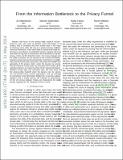| dc.contributor.author | Salamatian, Salman | |
| dc.contributor.author | Fawaz, Nadia | |
| dc.contributor.author | Medard, Muriel | |
| dc.contributor.author | Makhdoumi Kakhaki, Ali | |
| dc.date.accessioned | 2016-01-20T16:43:28Z | |
| dc.date.available | 2016-01-20T16:43:28Z | |
| dc.date.issued | 2014-11 | |
| dc.identifier.isbn | 978-1-4799-5999-0 | |
| dc.identifier.issn | 1662-9019 | |
| dc.identifier.uri | http://hdl.handle.net/1721.1/100948 | |
| dc.description.abstract | We focus on the privacy-utility trade-off encountered by users who wish to disclose some information to an analyst, that is correlated with their private data, in the hope of receiving some utility. We rely on a general privacy statistical inference framework, under which data is transformed before it is disclosed, according to a probabilistic privacy mapping. We show that when the log-loss is introduced in this framework in both the privacy metric and the distortion metric, the privacy leakage and the utility constraint can be reduced to the mutual information between private data and disclosed data, and between non-private data and disclosed data respectively. We justify the relevance and generality of the privacy metric under the log-loss by proving that the inference threat under any bounded cost function can be upperbounded by an explicit function of the mutual information between private data and disclosed data. We then show that the privacy-utility tradeoff under the log-loss can be cast as the non-convex Privacy Funnel optimization, and we leverage its connection to the Information Bottleneck, to provide a greedy algorithm that is locally optimal. We evaluate its performance on the US census dataset. Finally, we characterize the optimal privacy mapping for the Gaussian Privacy Funnel. | en_US |
| dc.language.iso | en_US | |
| dc.publisher | Institute of Electrical and Electronics Engineers (IEEE) | en_US |
| dc.relation.isversionof | http://dx.doi.org/10.1109/ITW.2014.6970882 | en_US |
| dc.rights | Creative Commons Attribution-Noncommercial-Share Alike | en_US |
| dc.rights.uri | http://creativecommons.org/licenses/by-nc-sa/4.0/ | en_US |
| dc.source | MIT web domain | en_US |
| dc.title | From the Information Bottleneck to the Privacy Funnel | en_US |
| dc.type | Article | en_US |
| dc.identifier.citation | Makhdoumi, Ali, Salman Salamatian, Nadia Fawaz, and Muriel Medard. “From the Information Bottleneck to the Privacy Funnel.” 2014 IEEE Information Theory Workshop (ITW 2014) (November 2014). | en_US |
| dc.contributor.department | Massachusetts Institute of Technology. Department of Electrical Engineering and Computer Science | en_US |
| dc.contributor.mitauthor | Makhdoumi Kakhaki, Ali | en_US |
| dc.contributor.mitauthor | Medard, Muriel | en_US |
| dc.relation.journal | Proceedings of the 2014 IEEE Information Theory Workshop (ITW 2014) | en_US |
| dc.eprint.version | Original manuscript | en_US |
| dc.type.uri | http://purl.org/eprint/type/ConferencePaper | en_US |
| eprint.status | http://purl.org/eprint/status/NonPeerReviewed | en_US |
| dspace.orderedauthors | Makhdoumi, Ali; Salamatian, Salman; Fawaz, Nadia; Medard, Muriel | en_US |
| dc.identifier.orcid | https://orcid.org/0000-0003-4059-407X | |
| mit.license | OPEN_ACCESS_POLICY | en_US |
